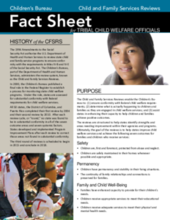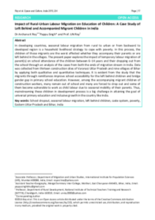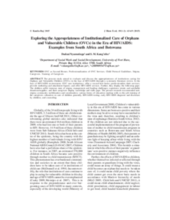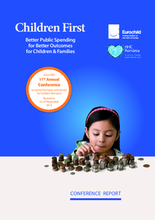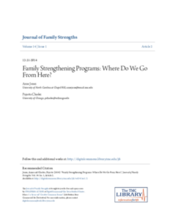Displaying 331 - 340 of 505
This case study of the child protection system in the United Republic of Tanzania is part of a UNICEF global initiative, undertaken in collaboration with Global Affairs Canada to document national child protection frameworks to gain an understanding of the country, the response of government and other actors, as well as other factors contributing to success in protecting children from violence, exploitation and abuse.
Using panel data from the Philippines' Family Income and Expenditure Survey (FIES), this paper also looks into how such dynamics affects children's welfare. Meanwhile, to complement the profile on child poverty, this paper scrutinizes how the government has faired so far in addressing poverty via its biggest social protection programme, the Pantawid Pamilyang Pilipino Program (4Ps). The brief review also touches on a variant of the Pantawid Pamilya that caters to street families, particularly its design and targeting strategy, and other Department of Social Welfare and Development programmes involving the welfare of children.
This factsheet looks at whether States in the US are following best practices in regards to the Indian Child Welfare Act, such as notification of Tribes and placement preferences. Findings from the Reviews are presented.
This paper explores the impact of temporary labour migration of parent(s) on school attendance of children between 6–14 years and their dropping out from school through an analysis of cases from both ends of the migration stream in India - children accompanying their migrant parents and children left behind.
This paper calls for creative pathways of engagement that delineate places of belonging for and with Indigenous youth in care.
The present study aimed to evaluate and discuss the appropriateness of institutions caring for Orphans and Vulnerable Children (OVCs) in the face of HIV/AIDS through a systematic literature review.
This report summarizes the discussions and activities held at Eurochild’s 11th Annual Conference, co-hosted by Hope and Homes for Children in Bucharest, Romania on 26-28 November 2014.
The South African Child Gauge is the only publication in the country that provides an annual snap-shot of the status of South Africa’s children.
This article provides an overview of inter-country adoption of children from the United States to other countries.
This paper describes a study that examined the economic challenges faced by low-income, unmarried parents in the United States who participated in the Strong Couples - Strong Children (SC - SC) program, a federally funded initiative intended to help strengthen relationships of fragile families by providing relationship education programs.



